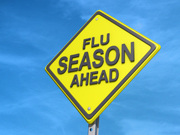
Influenza is a highly contagious disease that can be fatal, especially in people who are older or have compromised immune systems. Symptoms of the flu include aches, pains, chills, fever, congestion, cough, sore throat, and headache – no one likes it. No one wants it. Considering that flu season in the US can last as long as October through May, some may ask, how can you keep yourself from getting the flu? By getting your annual flu vaccination. The Centers for Disease Control recommends that every person over the age of six months be vaccinated against influenza disease, more commonly known as "the flu."
Each year the CDC determines which strains of the flu are likely to be the most prevalent, and creates a flu vaccine to protect against those strains. The vaccine is made of inactive or weakened (attenuated) flu antigens. You cannot get the flu from the flu vaccine, though some mild side effects are possible. The CDC assures us that the side effects are much less severe than the symptoms caused by the actual flu virus.
While everyone should get a flu vaccine every year, it is especially important for children under five years old (and especially under two,) pregnant women, people over 65 years old, people with certain medical conditions including diabetes, asthma, and chronic lung disease, and healthcare personnel or people who live with or take care of those in a high-risk group.
In addition to a greatly reduced chance of getting the flu yourself, there are other benefits to getting a flu vaccine every year:
Each year the CDC determines which strains of the flu are likely to be the most prevalent, and creates a flu vaccine to protect against those strains. The vaccine is made of inactive or weakened (attenuated) flu antigens. You cannot get the flu from the flu vaccine, though some mild side effects are possible. The CDC assures us that the side effects are much less severe than the symptoms caused by the actual flu virus.
While everyone should get a flu vaccine every year, it is especially important for children under five years old (and especially under two,) pregnant women, people over 65 years old, people with certain medical conditions including diabetes, asthma, and chronic lung disease, and healthcare personnel or people who live with or take care of those in a high-risk group.
In addition to a greatly reduced chance of getting the flu yourself, there are other benefits to getting a flu vaccine every year:
- When you are vaccinated, the people around you are also less likely to get the flu, especially those more vulnerable to flu illness and complications.
- Pregnant women who are vaccinated also offer some protection to their babies, for up to six months after the babies’ birth.
- Getting vaccinated for the flu can make your illness milder if you do happen to catch another strain of the flu.
- Flu vaccination reduces the risk of hospitalization, death, and other serious flu outcomes like secondary infection or pneumonia
Some of the Main Reasons Some Individuals Opt Not to Get an Annual Flu Vaccination:
Costs
One reason many people fail to get their annual flu shot is cost. The flu shot is expensive to produce, and it used to be expensive to receive. However, as a result of the Affordable Care Act, the flu vaccine as well as certain other vaccines and preventative medicines are now covered by the majority of health insurance plans, with no deductible, co-payment, or coinsurance required. This is true even for plans not purchased through state and federal health insurance marketplaces. Covered plans include group and employee health insurance plans. So cost is no longer a reason to avoid getting a flu vaccine.
A Lot of Individuals Don't Enjoy Getting Shots or Are Afraid of Needles
Another reason people may avoid getting the vaccine is, they just don’t like shots. The flu vaccine is available in multiple forms, including a trivalent (covers three strains,) injection, a quadrivalent (covers four strains,) injection, and a quadrivalent nasal spray. Not all forms are recommended for everyone; your doctor will help you determine which form is best for you. For example, if you hate needles, you cannot automatically opt for the nasal spray. However, there will soon be a new form of the flu vaccine available, in a patch. This transdermal flu vaccine is virtually painless, so even people who are scared of needles, or just hate the thought of them, have nothing to worry about.
The Flu Patch Vaccine is Cost Effective, Less Painful, Safe & Effective
The flu vaccine patch contains stainless steel microneedles. The microneedles are covered in the inactivated flu virus, and the patch is gently pressed onto the skin, so that the vaccine can dissolve into the skin. In clinical trials, test subjects could even self-administer the vaccination patch, which can reduce the number of vaccination administration errors. Additionally, makers of the flu patch plan to see it available by mail, which would eliminate one more road block to getting the flu vaccine: the trip to the doctor’s office or clinic.
So if you have been going back and forth about getting your annual flu vaccination, there is really no reason to do so anymore. The flu shot does not cause the flu, and its side effects are minimal. Additionally, under the Affordable Care Act, flu vaccines as well as many other vaccines are now 100% covered by the vast majority of insurance companies, making the vaccine completely free of charge. Finally, with the advent of the new flu patch, even people who don’t want to get a shot of any kind can still get vaccinated again influenza disease, no injection necessary. Getting vaccinated against flu will not only help protect yourself, but you will also be helping to protect those around you as well. Sign up today to learn more about the flu patch and when it will become available.
Author Bio: Jeff Shjarback, MBA is a Digital Marketing Strategy Consultant that has worked as a Vaccine Specialist and Biological Products Specialist. Jeff enjoys blogging about internet marketing, small business, lead generation, economics, innovation & emerging technology, future trend analysis and business philosophy. Jeff is one of the main contributors to FluPatch.org. To learn more about Jeff, you can visit his Google Author Profile.


 RSS Feed
RSS Feed
